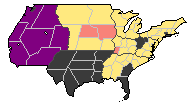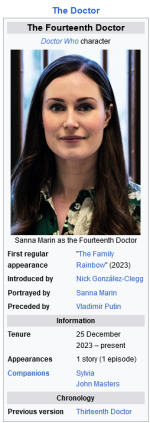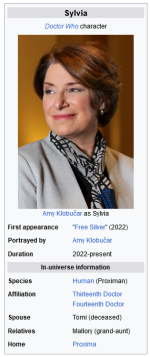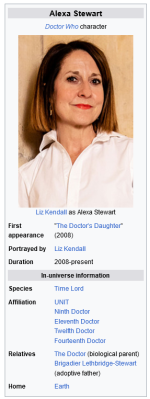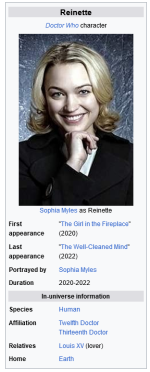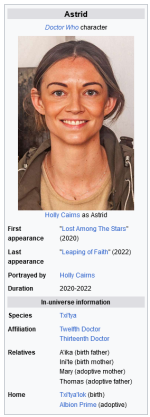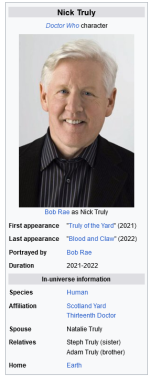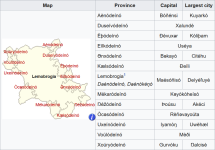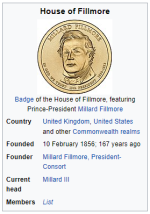Okay, here's the final [for now] update of
The Polarity is Reversed, featuring the Twelfth Doctor and the last three companions.

The
Twelfth Doctor, acted by Stefani Germanotta, is both the most upbeat and surreal Doctor since Bowie's Seventh, and the most dark yet [only to be eclipsed by her successor the Thirteenth]. The Doctor in this incarnation is someone seeking to escape her past yet cannot do so. Her 'fam' she jealously protects, yet the early end of Little Bobby Tables haunts her. This is a Doctor who fiercely wants to save everyone, and yet Bobby, followed by Celeste and finally Jack, hammers it home that in some way, she's the destroying force, ripping them apart from their lives.
By the time Reinette and Astrid joins, she's still someone who has the extraordinary zeal to protect and save, yet it's increasingly weighed down by guilt. Guilt for failing to save her companions, guilt for the Time War, and it is this guilt that Missy, acted by Taylor Swift, seeks to prey on. In the end, after Jack rode off in the sunset in 1940s Los Alamos to his certain death by molecular disintegration, the Doctor proves more exhausted than ever, and in her last episode - where the Cybermen try to invade Toronto [of all places], she chooses to sacrifice herself instead of risking her companions.
The theme of Germanotta's Doctor was more focused on the supernatural elements, instead of technological as in Moon's era, especially with the Universal Algorithm (that Little Bobby Tables was intended to calculate and then alter to destroy all that the Calculator opposes) and then the Star Chamber (an organisation of unimaginably-powerful yet incredibly insular aliens). The public reception to this was mixed to positive.
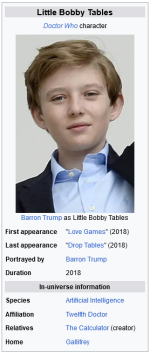
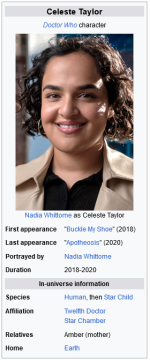
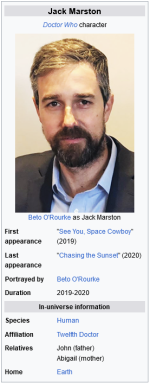
The three remaining companions of the Twelfth Doctor.
Little Bobby Tables (the name originally coming from an in-joke by writer Randall Munroe) was an artificial intelligence in a humanoid chassis created by the Doctor's renegade child the Calculator who desired to calculate how the universe worked - to discover the "Universal Algorithm" - so he could then alter it using time crystals (potentially crashing it in the process and destroying the entire universe) and created Bobby to calculate the Algorithm. Bobby, however, rebelled against his creator and sought to escape, stumbling into a newly-regenerated Doctor in the process.
In the end, in the final episode of Series 10, "Drop Tables", Bobby realises that he has finally worked out the Universal Algorithm, and that his creator is aware of this. In a bid to save the universe from the Calculator's plans, he seizes the time crystals and calculates the Calculator - and himself - out of existence. The Doctor remembers his existence, and that of her wayward child, because... well, it's never quite explained why. All that we have is a cryptic statement by Randall Munroe that "the universe can't be re-calculated that easily" a few years later.
Celeste Taylor is a normal average human in 2018 Earth who stumbles into the TARDIS. She is presented as a working-class lass from London who is a part-time carer for her mum and is very strong-willed. She knows what she wants, and will argue passionately for it. She rapidly became one of the more popular companions of New Doctor Who, especially for her relatability to many viewers as the show became more complex.
Her end is widely seen as one of the most tragic ones in recent Who history. The Star Chamber - the organisation of Star Children [inspired by Celtic tales of Fair Folk] - declared war on the entire universe because one of the 1,000 Star Children perished in some attack by mortals. There is a rule that there is always 1,000 Star Children, no more, no less. In "Apotheosis", the final episode of the first half of Series 12 [it was somewhat controversial that they released it in two halves], Celeste realised that she had to step into the role, become the missing 1,000th Star Child, through a process that resulted in the loss of her humanity in a bid to end the war. The war did end as the Chamber tallied 1,000 and saw no reason to continue.
Jack Marston is a cowboy. A well-read cowboy who will fuck anyone or anything of age if they're willing. But a cowboy all the same, which makes him being in 2500 Earth a puzzle. It turns out that this was due to a time anomaly that sucked him into the future. He yearns to go back home, and this is why he joins the Doctor in her travels. The time anomaly proves a key plot of Series 11, and even though it's fixed, he still continues with the Doctor, hoping that they can land back to his time where he can return to his ranch in Texas. The closest he got was in the Christmas Special where he met his parents when they were young outlaws in a gang, but he decided to not stay there.
The time anomaly left him with a slow-acting molecular disintegration, and he learns of this in the first episode of Series 12, which was in a big space hospital that faced an attack by plants. He hides this from the rest of the crew out of pride, even as the condition worsens. The last episode, "Chasing the Sunset", is set in Los Alamos during the Manhattan Project. The Daleks seek to seize nuclear bombs for their own ends and the Doctor and her crew has to stop them. At the end, Jack silently walks away from the TARDIS, gets on a horse, and rides off into the sunset.
It is heavily implied that the Doctor knew all along that Jack was slowly dying yet felt it impossible to bring up as well, given how she is even more broken the Christmas episode (her final one, "The Edge of Glory"). It is definitely one of the more mixed-reception Christmas episodes, but viewer numbers was high. At the end, the Twelfth Doctor regenerates into someone who doesn't feel all the oppressive guilt, the unrepentant Thirteenth.
I also made a graph of the episodes that had each companion, if that helps.






